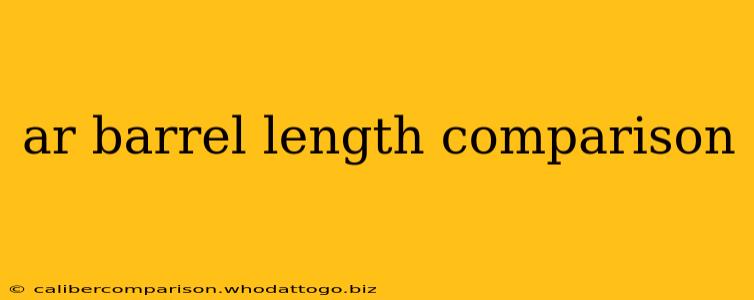Choosing the right barrel length for your AR-15 is a crucial decision impacting accuracy, velocity, and overall performance. This comprehensive guide explores the various barrel lengths available, their pros and cons, and helps you determine the ideal length for your specific needs.
Understanding the Impact of Barrel Length
The length of your AR-15 barrel directly affects several key performance characteristics:
Muzzle Velocity:
Shorter barrels inherently produce lower muzzle velocities compared to longer barrels. This is because the propellant has less time to burn and fully accelerate the projectile before exiting the barrel. This decreased velocity translates to a shorter effective range and potentially less stopping power.
Accuracy:
Barrel length plays a complex role in accuracy. While longer barrels generally offer better accuracy due to the increased bullet stabilization and time for the projectile to reach its optimal velocity, this isn't always a straightforward relationship. Other factors such as barrel quality, ammunition, and the shooter's skill significantly impact accuracy. A shorter barrel, properly designed and manufactured, can still deliver acceptable accuracy for many applications.
Gas System:
Barrel length directly influences the choice of gas system (direct impingement, piston-driven, or short-stroke piston). The gas system's efficiency is tied to the barrel length, and an improper match can result in malfunctions or excessive wear and tear. Shorter barrels often require adjustments to the gas system to function reliably.
Weight and Maneuverability:
Shorter barrels make the rifle lighter and more maneuverable, particularly beneficial in close-quarters combat (CQB) scenarios or for individuals who prioritize portability. Longer barrels add weight and length, potentially hindering maneuverability in tight spaces.
Common AR-15 Barrel Lengths and Their Applications:
Here's a breakdown of common barrel lengths and their typical applications:
7.5-inch barrels:
- Pros: Extremely compact and lightweight, ideal for CQB and home defense.
- Cons: Significantly reduced velocity and effective range; increased recoil; higher chance of malfunction with certain ammunition.
10.5-inch barrels:
- Pros: A balance between compactness and performance; better velocity than 7.5-inch barrels; still highly maneuverable.
- Cons: Still limited effective range compared to longer barrels; potential for increased recoil.
14.5-inch barrels:
- Pros: A popular choice offering a good balance of accuracy, velocity, and maneuverability; often paired with a pinned-and-welded muzzle device to meet legal requirements for certain barrel lengths.
- Cons: May be slightly less maneuverable than shorter barrels.
16-inch barrels:
- Pros: The standard length for many AR-15 rifles; a good balance of accuracy, velocity, and maneuverability; a common choice for hunting and recreational shooting.
- Cons: Slightly less maneuverable than shorter barrels.
18-inch barrels:
- Pros: Increased accuracy and velocity compared to shorter barrels; popular choice for longer-range shooting and hunting.
- Cons: Heavier and less maneuverable than shorter barrels.
20-inch and longer barrels:
- Pros: Optimized for long-range accuracy and velocity.
- Cons: Significantly heavier and less maneuverable; not ideal for CQB.
Choosing the Right Barrel Length for You:
Consider these factors when choosing a barrel length:
- Intended Use: Home defense, hunting, competition, or recreational shooting will heavily influence the optimal barrel length.
- Shooting Environment: CQB situations require shorter, more maneuverable barrels, whereas long-range shooting demands longer barrels for increased accuracy and velocity.
- Personal Preferences: Your personal comfort level and shooting style will also play a role.
Ultimately, the "best" barrel length is subjective and depends on individual needs and preferences. Thoroughly researching your options and considering the factors outlined above will help you make an informed decision and select the perfect barrel for your AR-15. Remember to always consult relevant laws and regulations regarding barrel lengths in your area.

